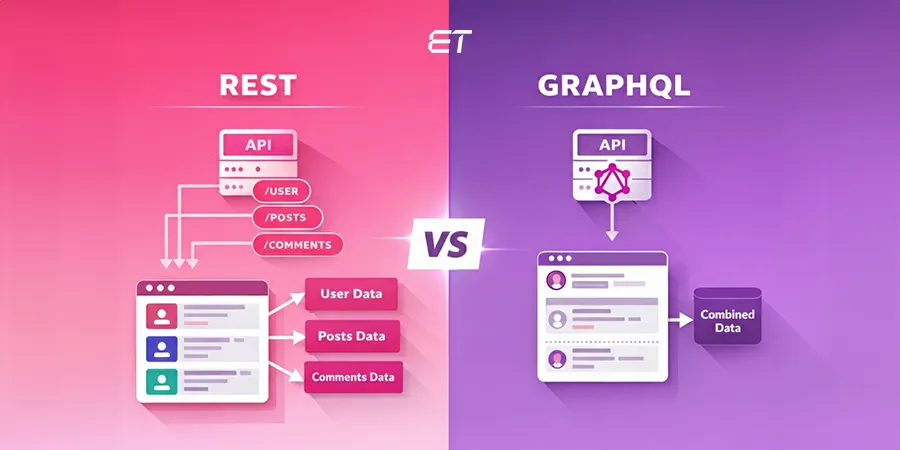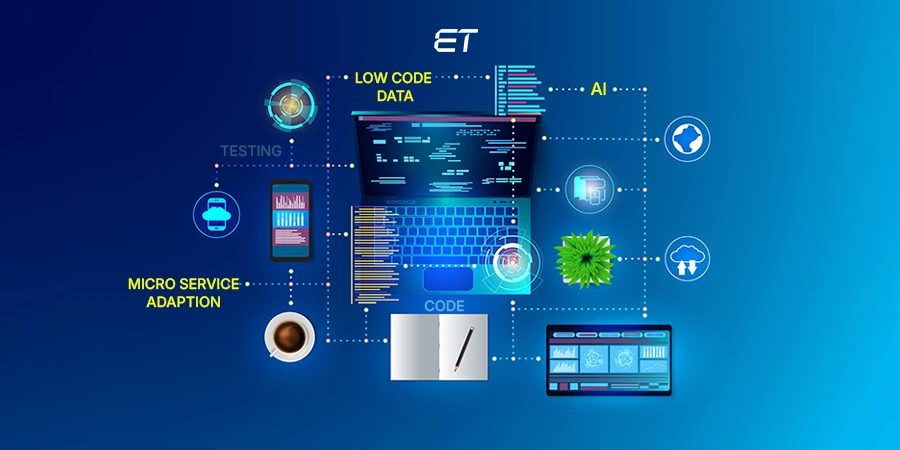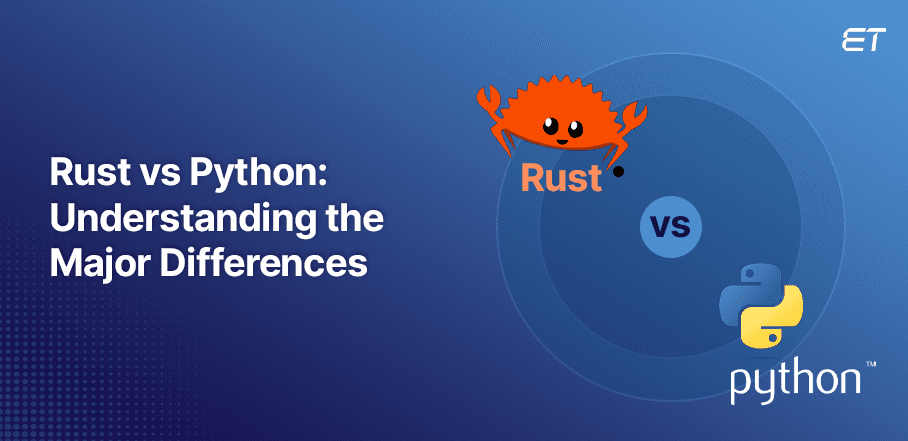
Rust vs Python: Understanding the Major Differences
Choosing the right programming language is important for your project. Why?
Because it significantly impacts its performance, development time, and maintainability. Rust and Python are two popular languages that cater to different needs. However, they are often compared for their unique strengths.
Rust is known for its performance and safety, whereas Python is known for its simplicity and accessibility. Each programming language has their own set of advantages and challenges.
In this blog, we will learn about the major differences- Rust vs Python, their advantages and challenges. This will help you get a clear picture of both languages, allowing you to make informed decisions for your business.
Which language is the perfect fit for your next project? Let’s explore your options together.
Rust – A Quick Overview
Rust is a cutting edge programming language designed to make coding error-free and more efficient. It was created to tackle common issues developers face, like bugs caused by memory errors, without sacrificing performance. It is a blend of the speed of C++ and the safety of Python.
Rust stands out from the other programming languages for many reasons. Some of them are:
- Rust helps prevent crashes and bugs by managing memory for you. It ensures your code doesn’t accidentally break something, making it perfect for building reliable software.
- It is as fast as traditional system-level languages like C or C++, making it ideal for performance-critical tasks like gaming engines, web browsers, and operating systems.
- Writing multi-threaded programs is easier in Rust, reducing the chances of errors when multiple tasks run at once.
Companies like Mozella, Dropbox, and Microsoft use it to build scalable, secure, and high-performance applications.
Advantages of Rust
As a decision-maker, you now know the difference- Rust vs Python, but it is also important to know its advantages before you make any decisions. The advantages of Rust are as follows:
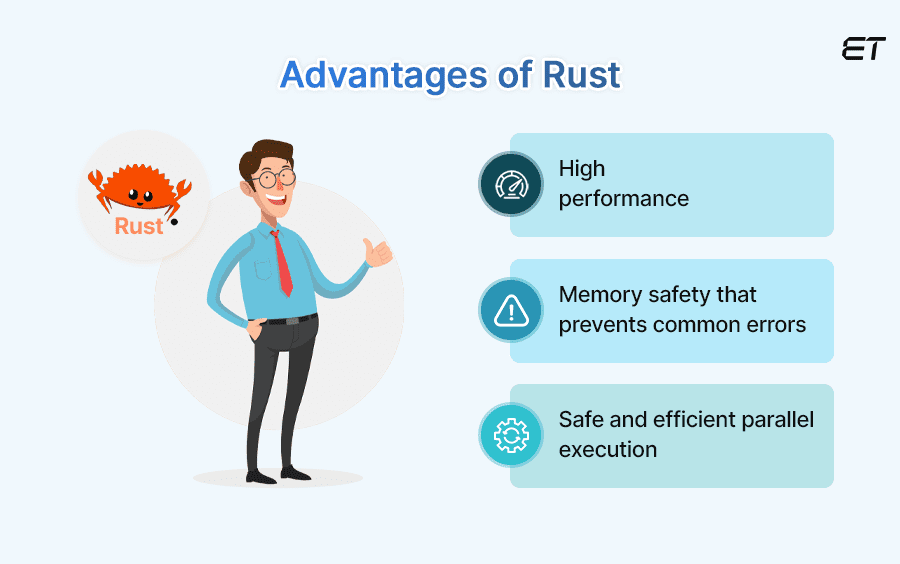
High Performance
Rust provides performance comparable to C and C++. Its zero-cost abstractions ensure that high-level constructs do not add overhead, making it ideal for performance-based applications such as game engines, operating systems, and real-time systems.
Memory Safety
Its ownership system and borrow checker enforce memory safety at the time of compilation that prevents common programming errors like null pointer dereferencing, buffer overflows, and use-after-free bugs. This safety ensures strong and secure applications without needing a garbage collector.
Concurrency Support
Its concurrency model, with its ownership and borrow checker, allows for safe and efficient parallel execution. This prevents data races and other concurrency-related issues and makes it easier to write reliable multithreaded code.
Limitations of Rust
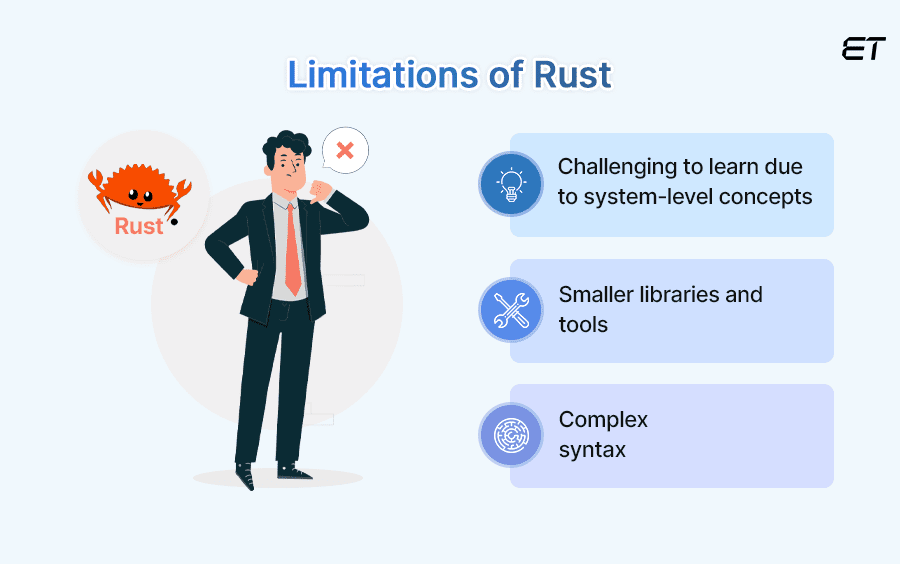
Everything has its own set of advantages as well as challenges. We’ve already looked at the advantages above, so now it’s time to look at the challenges it poses while implementing it into your project.
Steep Learning Curve
Its system-level programming concepts and strict compiler rules create a steep learning curve, especially for developers new to systems programming. This can slow down initial development and require more time for onboarding new developers.
Smaller Ecosystem
Although Rust’s ecosystem is growing, it is still smaller than that of more established languages like Python. Therefore, fewer libraries and tools are available, which can be a limitation for some applications that rely heavily on third-party packages.
Python – A Quick Overview
Python is a popular and beginner-friendly programming language known for being simple, versatile, and powerful. It’s often called the ‘Swiss Army knife’ of programming because you can use it for almost anything—from building websites to analyzing data.
Python is widely loved by developers because of the following reasons:
- Python’s syntax is clear and human-like, making it perfect for beginners.
- You can use Python for web development, data science, artificial intelligence, automation, game development, and much more.
- It has a large, active community. This means tons of tutorials, libraries, and tools are available to help you, no matter your project.
From Netflix’s recommendation engine to Instagram’s backend, Python powers some of the world’s biggest tech platforms. It’s also widely used in fields like finance, healthcare, and scientific research.
Advantages of Python
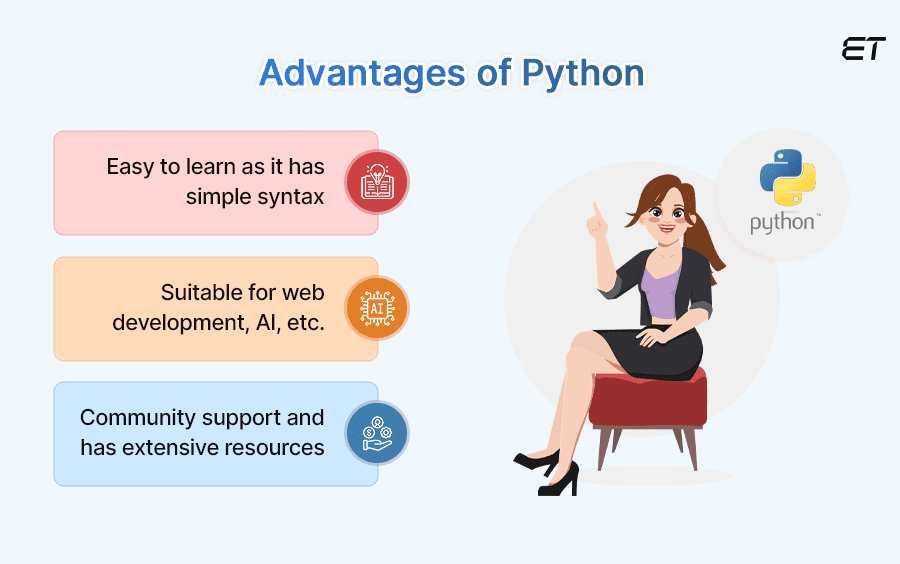
In order to make a better decision and understand what is best for your project, let’s also discuss the advantages of Python.
Easy to Learn and Understand
Python’s simple and readable syntax makes it an excellent choice for beginners and experienced developers. The language’s design highlights code readability, allowing developers to write clear and concise code, which assists in speeding up development and reduces the learning curve.
Resourceful
Python supports multiple programming prototypes, including procedural, object-oriented, and functional programming. Its standard library and a vast ecosystem of third-party packages make Python suitable for various applications.
Community Support
Python has a large, active, and supportive community. This means a pool of resources for learning, troubleshooting, and development. A vast array of libraries and frameworks are available which enhances the capabilities and simplifies the development tasks.
Limitations of Python
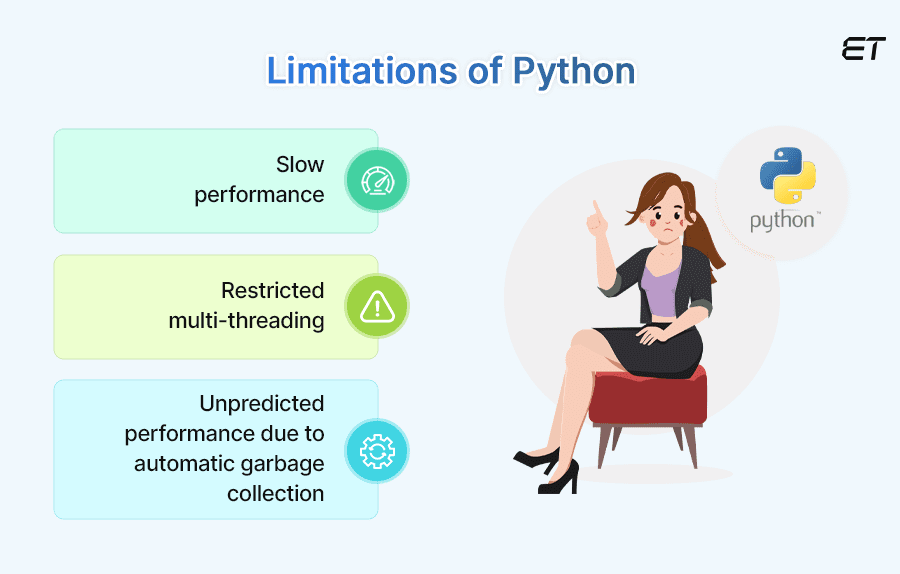
While we’re at it, let’s also understand the challenges of Python.
Slow Performance
Python’s interpreted nature makes it slower when compared to compiled languages like Rust. Although Python is efficient enough for many applications, its performance limitations can become a restriction for computationally intensive tasks.
Concurrency Limitations
Python’s Global Interpreter Lock (GIL) restricts the execution of multiple threads within the same process, which limits the effectiveness of multithreaded applications (but there are alternatives it). GIL can be a significant limitation for applications requiring high levels of concurrency and parallelism.
Transform your vision into cutting-edge solutions with elite Python developers. Propel your project to new heights today!
Differences between Rust vs Python
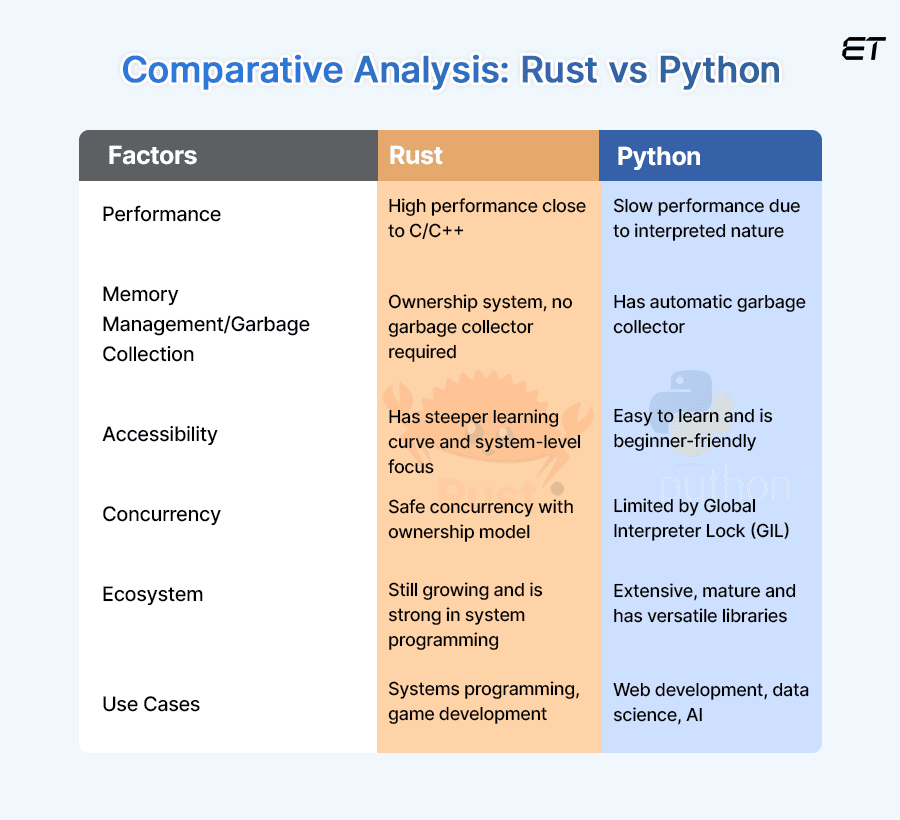
Without wasting any time, let’s get to the point and discuss the comparative analysis- Rust vs Python and how they are different from each other.
1. Rust vs Python – Performance
- Rust: Rust is designed for performance and efficiency of the application and is often compared to languages like C and C++. It provides zero-cost abstractions, which means, the abstractions introduced by the language do not add runtime overhead.
Therefore, it is ideal for applications where speed and low-level control are critical, such as game engines, operating systems, and high-frequency trading systems.
The language’s performance stems from its ability to compile directly to machine code, optimizing for speed and resource management.
# Rust
fn main() {
println! ( “Hello, world!” ) ;
} - Python: On the other hand, Python is an interpreted language which is generally slower than compiled languages like Rust. Unlike Rust, it is easy to use and is flexible enough to make up for this in many applications.
It is sufficient for tasks where development speed and simplicity are more important than just raw performance, such as web development, scripting, and data analysis.
While Python can integrate with performance-based code written in C or C++, it fundamentally cannot match the speed of Rust in computationally intensive tasks.
# python
print(“Hello, world!”)
2. Memory Management
- Rust: When talking about memory management, it is Rust’s standout feature. It employs a system of ownership with rules that the compiler checks at the time of compiling to ensure memory safety without needing a garbage collector.This approach prevents common bugs such as null pointer dereferencing and buffer overflows and makes it fast and reliable. The ownership model also facilitates safe concurrency, allowing multiple threads to execute without causing data races.
- Python: Python uses automatic garbage collection to manage memory, which makes the development process easier as programmers don’t need to allocate and free memory manually.However, this can lead to unpredictable performance and higher memory usage, as the garbage collector can cause latency during its operation.Python’s garbage collector is generally adequate for many applications, but it can become an obstruction in performance-based systems, especially those requiring real-time performance.
3. Rust vs Python – Syntax and Accessibility
- Rust: Rust has a steeper learning curve compared to Python, mainly due to its system-level programming concepts and strict compiler rules. This complexity can be daunting for beginners, but it pays off in terms of performance and safety.Rust’s syntax is designed to enforce best practices and catch errors at compile time, which can lead to more reliable and maintainable code in the long run.
# Function in Rustfn add(a: i32, b: i32) -> i32 {
a + b
}fn main() {
let sum = add(5, 10);
println!(“Sum: {}”, sum);
} - Python: Python is known for its straightforward syntax and readability, which makes it an excellent choice for beginners and also for fast application development. The language’s design emphasizes code readability and simplicity, allowing developers to write clear and concise code.Its standard library and the availability of numerous third-party libraries further enhance its accessibility, making it suitable for a wide range of applications, from web development to scientific computing.
# Function in Python
def add(a, b):
return a + bsum = add(5, 10)
print(f”Sum: {sum}”)
4. Concurrency
- Rust: Rust’s ownership model and the concept of borrowing make it safe to have multiple computations at the same time (concurrency). These features allow developers to write concurrent code that is free of data races, a common problem in multithreaded programming.Its concurrency base is designed to be both powerful and safe, enabling the development of high-performance parallel applications.
- Python: Contradictorily, Python’s Explore More Info is a well-known limitation for multithreaded applications. The GIL ensures that only one thread executes the bytecode at a time, which although simplifies memory management but restricts concurrent execution.While Python supports concurrency through multiprocessing and asynchronous programming, these approaches can add complexity and do not fully use multicore processors. Despite this, Python’s concurrency models are sufficient for many I/O-bound applications.
5. Ecosystem and Libraries
- Rust: Rust’s ecosystem is smaller than Python’s but is rapidly growing. It offers powerful libraries and tools for systems programming and support for web development frameworks like Rocket and Actix.The Rust community is known for its focus on performance, safety, and high-quality documentation, making it a strong choice for developers looking for reliable and efficient tools.
- Python: Python boasts a vast and mature ecosystem with libraries and frameworks for almost every domain, including web development (Django Flask), data science (NumPy, pandas), and artificial intelligence (TensorFlow, PyTorch).This large and active community continuously contributes to Python’s growth and ensures abundant resources for learning and troubleshooting.Now that we have covered the differences- Rust vs Python, let’s also understand the advantages and limitations of each so that you can get a clear picture while deciding which programming language is best suited for your application.
Let’s elevate your web app with cutting-edge Python development. Share your idea, and we’ll bring it to life.
Rust vs Python: Which Language to Choose?
Before we wrap up, let’s summarize the points we learned in the blog- Rust vs Python. Both offer their fair share of advantages and cater to different needs. Rust excels in performance, memory safety, and concurrency, making it ideal for systems programming and performance-based applications.
Python, on the other hand, with its ease of learning, accessibility, and strong community support, is perfect for fast development, data science, and a wide range of other applications. The objective of this blog was to help you understand the differences- Rust vs Python, their advantages, and limitations, as this will help you choose the right language for your specific project requirements.
As a decision-maker, it can be daunting and confusing to choose between Rust and Python and decide what is best for your project, and we understand that very well. If you are also looking for expert guidance and want to plan the right journey for your applications, we’re here for you. Reach out to our in-house expert now!
Frequently Asked Questions
What are the main performance differences in Rust vs Python?
Rust offers high performance comparable to C and C++ due to its compiled nature. Python, on the other hand, is slower but excels in ease of use and rapid development, suitable for many applications where speed is not the primary concern.
How does memory management differ in Rust vs Python?
Rust uses an ownership system for memory management, ensuring memory safety without a garbage collector. Python uses automatic garbage collection, simplifying memory management but potentially leading to unpredictable performance.
Which language is easier to learn in Rust vs Python?
Python is generally easier to learn due to its simple and readable syntax, making it ideal for beginners and rapid development. Rust has a steeper learning curve because of its system-level programming concepts and strict compiler rules, but it offers more robust safety and performance features.
What are the typical use cases for Rust vs Python?
Rust is ideal for performance-based applications, systems programming, and areas requiring high safety and concurrency, like game development and real-time systems. Python is versatile and widely used in web development, data science, artificial intelligence, automation, and rapid prototyping.
Is Rust going to replace Python?
Rust is unlikely to replace Python entirely because they serve different purposes. Rust excels in system-level programming with performance and safety, while Python is favored for its simplicity and versatility in web development, data science, and scripting. Both languages will continue to coexist, each thriving in their respective domains.
Is Rust just as fast as C++?
Yes, Rust is comparable to C++ in terms of speed. Both languages offer high performance for system-level programming, but Rust provides additional safety features without compromising on the speed. This makes Rust a strong contender for performance-critical applications.



